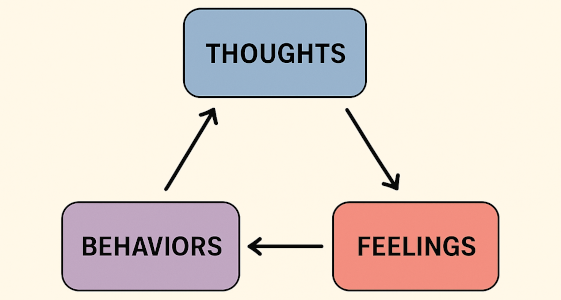What is Cognitive Behavioral Therapy (CBT)?
CBT is a type of psychological treatment that helps people understand and change unhelpful patterns of thinking and behavior.
CBT is based on the idea that thoughts, feelings, and behaviors are interconnected. A thought triggers an emotion, the emotion drives a behavior, and the behavior reinforces the original thought.

Think, Act, and Feel Better with CBT: Practical Cognitive Behavioral Therapy Tools for Life’s Ups and Downs by Gianna LaLota LMHC LPC
A clear, supportive guide to using Cognitive Behavioral Therapy to improve mood, manage stress, and build resilience. With practical exercises and everyday tools, LaLota helps readers recognize unhelpful thought patterns, change behaviors, and cultivate healthier emotions. Empowering and easy to follow, this book shows how small mindset shifts can create lasting positive change—an invaluable companion for anyone seeking balance, confidence, and emotional well-being.
For example, in the context of social anxiety:
- Thought: What you think or believe (cognitions, interpretations, appraisals). EG: “I will sound stupid if I speak.”
- Emotion: How you feel (physical and psychological feelings). EG: anxiety, fear, embarrassment.
- Behavior: What you do or actions you take (avoidance, engagement, physical acts). EG: avoiding social gatherings or staying silent.
Key features of CBT
- Structured and goal-oriented, usually focused on specific problems.
- Short-term, often involving 6 to 20 sessions (if you choose to work with a therapist).
- Evidence-based, widely proven effective for anxiety, depression, phobias, addiction, insomnia, and more.
- Skills-focused, teaching techniques such as cognitive restructuring, exposure, and mindfulness.
In essence, CBT helps you change the way you think to change how you feel and act.
Cognitive Behavioral Therapy in 7 Weeks: A Workbook for Managing Depression and Anxiety by Seth J. Gillihan PhD
A practical, step-by-step guide to improving emotional well-being. Through clear explanations and structured exercises, Gillihan helps readers identify negative thought patterns, reduce anxiety, and lift depression. Supportive and easy to use, this workbook empowers you to take charge of your mental health, build lasting resilience, and create a calmer, more balanced life—one week at a time.
Is a Therapist Necessary for CBT?
A therapist isn’t strictly necessary for CBT, but having one can be helpful, especially at the beginning.
When a therapist may be helpful
- Guidance and structure: CBT involves identifying automatic thoughts and cognitive distortions, which can be hard to do objectively on your own.
- Personalization: A therapist tailors techniques to your situation and helps you stay on track.
- Support: They can provide motivation and help you work through resistance or setbacks.
- Safety: For depression, trauma, or intense anxiety, professional guidance helps prevent overwhelm.
When self-directed CBT can work
- You use CBT-based self-help books, apps, or online courses, choosing those that are evidence-based.
- If your symptoms are mild to moderate and you’re motivated to practice regularly.
- You can reflect honestly and apply exercises like thought records, behavioral experiments, and journaling.
So, while you can do CBT on your own, working with a trained therapist usually leads to faster progress and deeper insight.
Learn More about CBT
The CBT Workbook for Mental Health: Evidence-Based Exercises to Transform Negative Thoughts and Manage Your Well-Being by Simon Rego PsyD and Sarah Fader. A collection of simple, evidence-based, exercises to challenge negative thoughts, reduce stress, and improve emotional balance. Practical and empowering, it offers clear tools to build resilience, manage anxiety and depression, and create lasting positive change in your daily life.
Cognitive Behavioral Therapy – 32 Strategies to Master Your Mind by Charles Kerwood. A set of simple practical tools to transform negative thinking and improve emotional well-being. With clear guidance and actionable techniques, it helps readers break unhelpful patterns, build self-awareness, and develop a more positive, empowered mindset for lasting mental and emotional growth.
28-Day CBT Workbook for Adults by Calvin Caufield. A practical, easy-to-follow guide designed to help you manage stress, anxiety, and negative thinking. With daily exercises and reflections, it teaches proven Cognitive Behavioral Therapy techniques to build confidence, emotional resilience, and a more positive mindset—one day at a time.
Cognitive Behavioral Therapy: Techniques for Retraining Your Brain by Jason M. Satterfield. Practical, science-based strategies to change unhelpful thinking, manage emotions, and improve well-being. Clear and accessible, it guides readers to build healthier habits, overcome negative patterns, and develop a more balanced, resilient mindset for lasting personal growth.
Book recommendations available at great prices from Amazon.
